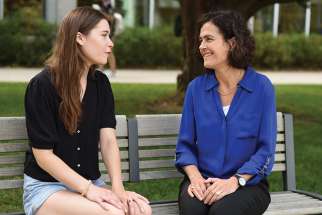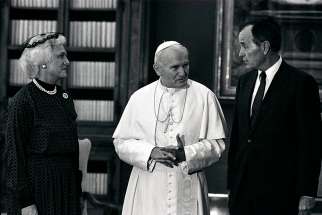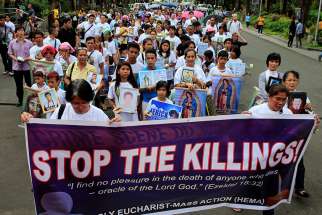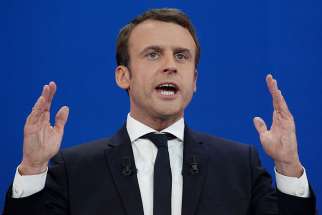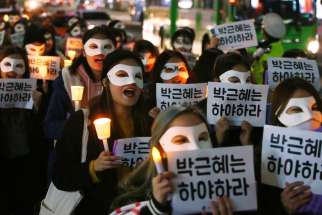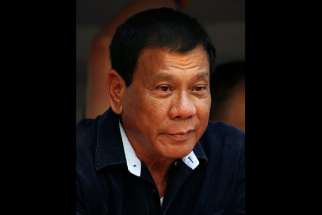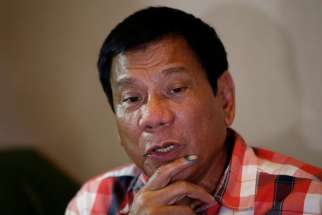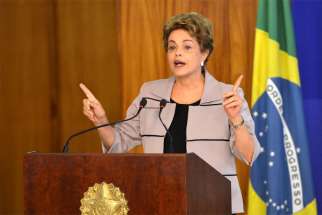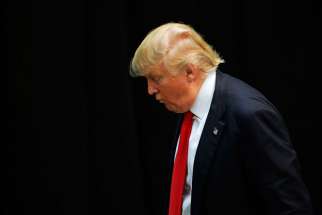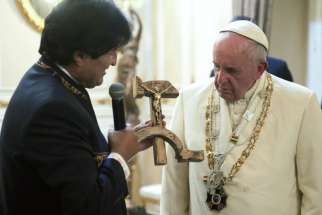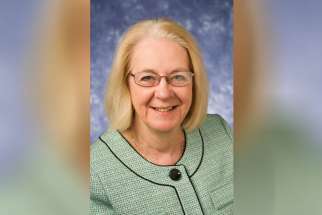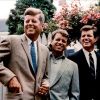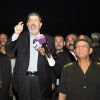Social justice at the core of new Brescia president
The new president of Brescia University College is a political scientist who wants to liberate social justice from politics and an educator who wants to free teaching from the classroom. Lauretta Conklin Frederking has been named the 13th principal and the new president of Canada’s only Catholic women’s college. The London, Ont., college was founded by the Ursuline Sisters in 1919. Its 1,500 students also attend Western University.
“Okay din si Duterte! (Duterte is alright!),” my dad said in approval. Gathered at the dinner table, talk of the boorish Filipino president peppered our family meal.
PARIS, France – Newly-elected President Emmanuel Macron, according to one of his biographers, embodies a new phenomenon in France known as “zombie Catholicism.”
South Korean Catholics seek president's resignation over scandal
SEOUL, South Korea – South Korean Catholics have demanded that President Park Geun-hye step down over a scandal that has been coined "Choi Soon-sil gate."
Texas cardinal, Los Angeles archbishop elected new heads of U.S. bishops
BALTIMORE – The United States Conference of Catholic Bishops on Tuesday elected Cardinal Daniel DiNardo of Galveston-Houston as its president, and Archbishop Jose Gómez of Los Angeles vice-president.
MANILA, Philippines – Philippines President-elect Rodrigo Duterte's win in May 9 national elections was "a strong reminder that people want change," said Fr. Anton Pascual, president of Radio Veritas, the country's largest Catholic radio network.
MANILA, Philippines – The head of the Philippine bishops' conference said it was time to "get up" and be faithful to God, as millions of Filipinos elected Davao City Mayor Rodrigo Duterte president.
SAO PAULO – Christian leaders said they felt uncomfortable that so many members of Brazil's Chamber of Deputies invoked religion as they voted to authorize an impeachment process for Brazilian President Dilma Rousseff.
Dear Catholics: Stop Trump, says National Review appeal
In an appeal to the faithful, 40 conservative Catholic leaders have denounced GOP frontrunner Donald Trump as a demagogue and danger to the nation and the Republican Party.
Pope Francis not amused by 'communist crucifix'
La Paz, Bolivia - Pope Francis shook his head no and told Bolivia's president, "this is not okay," after being presented with a “communist crucifix” — a carving of Christ crucified on the hammer of a hammer and sickle.
OECTA president to focus on relationship building
Over the next two years Ann Hawkins hopes to use her position as the new Ontario English Catholic Teachers Association’s (OECTA) president to build relationships and protect the Catholic classroom.
Romney’s ‘Mormon moment’ a test of tolerance in United States
WINDSOR, ONT. - Much has changed since the controversial 1960 campaign when John F. Kennedy, a Roman Catholic, ran for the American presidency.
For starters, the United States has become both more secular and more tolerant in accepting non-Protestant religious groups, such as Roman Catholics. At the same time, the country has become more politically partisan and seen religion take on a greater role in electoral politics than it did 50 years ago, according to Dr. David Campbell, professor of political science at the University of Notre Dame.
“Kennedy faced at least a potential stained glass ceiling,” said Campbell, an expert on religion, politics and civic engagement. The native of Medicine Hat, Alta. was speaking at Windsor’s Assumption University as part of a series examining the current presidential campaign.
He said that in becoming America’s first Catholic president, Kennedy overcame the obstacle of his religion after a historic speech in which he declared “Catholicism will not guide me” in policy decisions.
Today, a Catholic candidate such as John Kerry in the 2004 presidential race, or vice-president Joe Biden, might be questioned because they aren’t “Catholic enough” on issues such as abortion and same-sex marriage.
Catholics are now fully accepted in the political mainstream. But according to public polling, that’s not the case for candidates from all other religions, including Buddhists, Muslims and Mormons. Fifty-two years after Kennedy, Mitt Romney is attempting to become America’s first Mormon president.
Campbell said that “almost everyone” has a family relation, friend or neighbour who is Catholic, Protestant or Jewish, and recognizes them as “good people.” But that’s not the case for smaller faith groups. For Romney, the former Republican governor of Massachusetts, “that’s a problem.”
Campbell said that while Jews, for example, make up about the same proportion of the population as Mormons, they have integrated into society over the years by “building bridges” to other faiths. That isn’t the case with Mormonism, which Campbell says has a huge degree of internal “bonding” or “sticking together.”
Although Mormonism might not be fully tolerated, Campbell said religion generally plays a more important role in American politics, particularly among the political right.
“Religion has become a very powerful force shaping how Americans vote,” he said.
So, Campbell said, Romney has to walk a fine line between showing he fits into mainstream America without alienating the Republican base, which includes many Evangelicals.
Campbell said Romney has echoed Kennedy by emphatically declaring that his church will not “exert influence on presidential decisions.” In the second presidential debate Romney affirmed his belief in Jesus Christ and implied that voter acceptance of his faith will be a “test of our tolerance.”
The presidential campaign is “Romney’s moment,” Campbell said. If the Republican is elected, his Morman faith, like Catholicism 50 years ago, could start to be recognized as a more conventional religion.
ANTAKYA, Turkey - A spokesman for Egypt's bishops gave a cautious welcome to President Mohammed Morsi's reshuffling of top military officials.
Fr. Rafic Grieche, spokesman for the Egyptian bishops' conference, told Catholic News Service that Morsi's decisions were "positive in the sense of politics, but we have to see how he uses these new powers."
"In his first month of office, we still haven't seen anything positive. He did not implement any law that would please Christians," said Grieche, referring to long-standing demands to reform laws regarding personal status and the right to build churches.
After President Hosni Mubarak was ousted in February 2011, an Egyptian military council assumed broad powers, and Morsi was not the military's favoured candidate in presidential elections earlier this year.
On Aug. 12, Morsi deposed two top generals and cancelled a constitutional decree issued by the military that had stripped the presidency of much of its powers — just before he took office June 30. Morsi replaced that decree with one that gave him broad legislative and executive powers and seemingly brought an end to the military's 60-year dominance of Egyptian politics.
"In the time of Mubarak we couldn't say Christians were fully protected," said Grieche. He said that since the revolution began Jan. 25, 2011, there have been "several incidents between Copts and the military."
"Christians were not very happy with the army, either," he said.
Many Egyptian Christians blame the military for the killing of more than 25 Christian protesters in front of Cairo's state TV headquarters last October.
Grieche said Morsi's mid-August changes made little difference to worshippers at his Melkite Catholic Church of St. Cyril in the upscale Cairo neighbourhood of Heliopolis. The parishioners already were worried by the political gains of Islamist politicians they are convinced have long-term plans to transform Egyptian society.
The priest said many parishioners were "anxious," and several with the means to do so were moving to places like the Netherlands or the United States.
Youssef Sidhom, editor of Christian weekly newspaper Watani, admitted that there were serious concerns about Morsi's changes but added that the situation was more nuanced.
"The grave scenario (some believe) is that Morsi dealt a blow to the military in order to try and adopt his Islamist agenda," Sidhom told Catholic New Service.
But the president's retention of two key military leaders as advisers and his choice of replacements did not suggest a "drastic change" in terms of the makeup of the military, Sidhom added.
"Giving a civilian president full powers was remedying a sick situation. It was a step in Egypt's favour toward democracy," Sidhom said.
"It is true that in the absence of parliament, Morsi has more powers than he had, but this also means he may be forced to speed up elections. We might see these in three months if he is sensible and avoids further legal clashes," Sidhom added.


